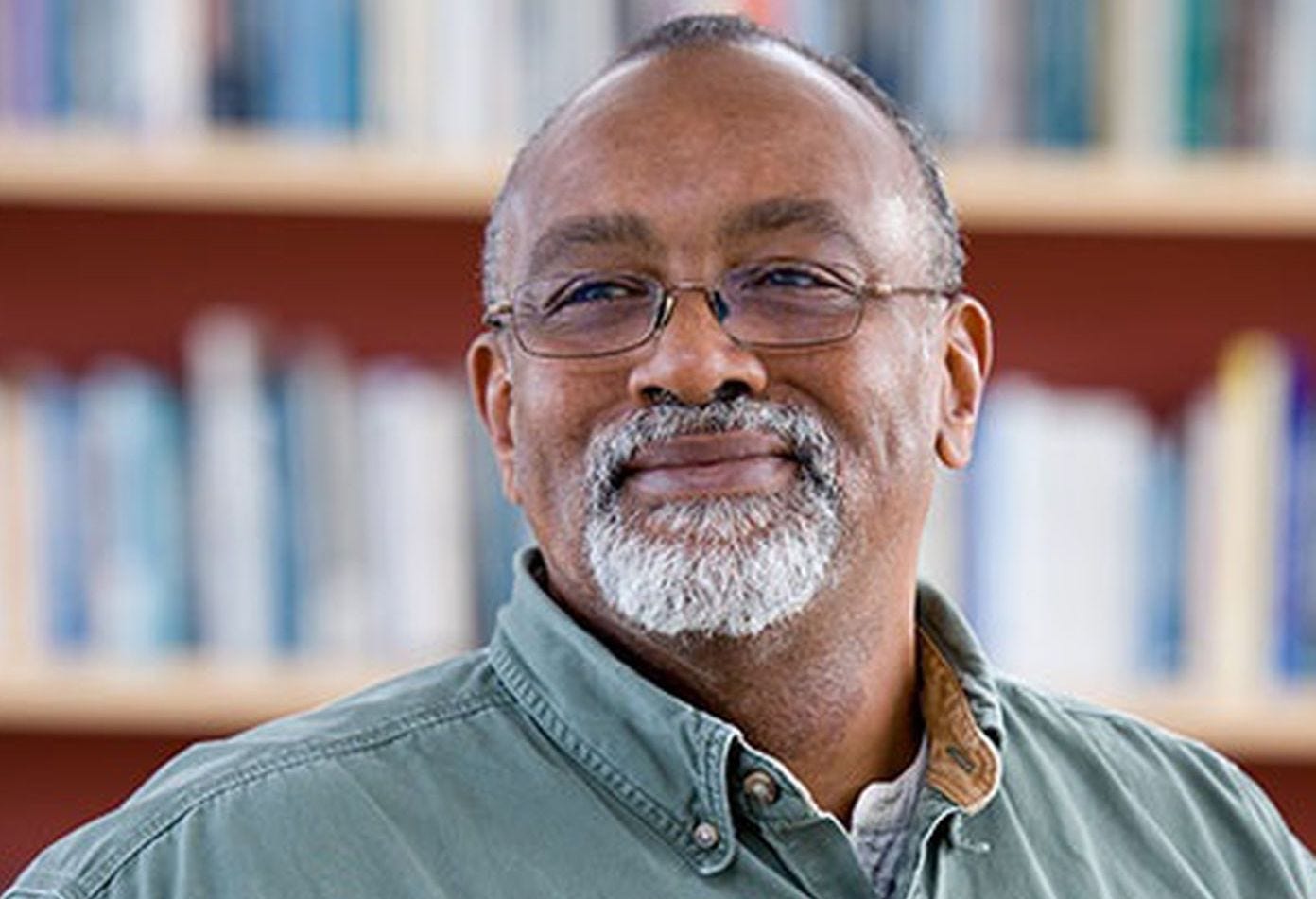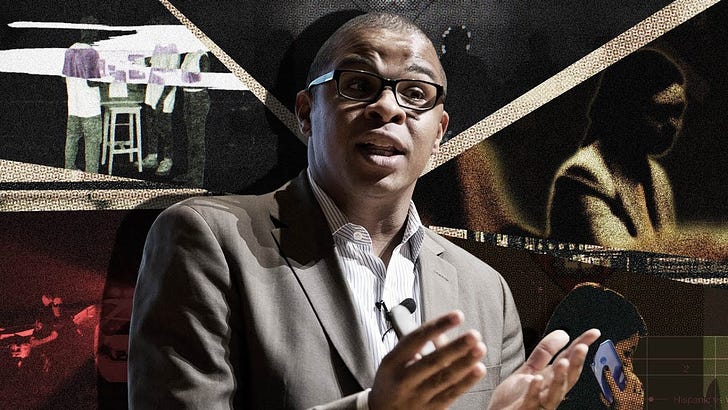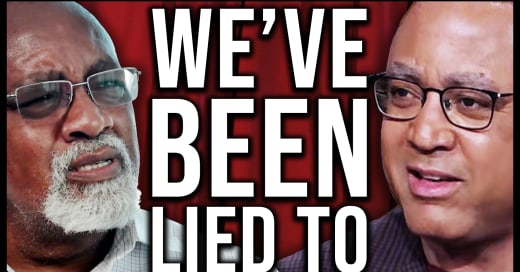
Discover more from Glenn Loury
Below I’m reposting my contribution to the Journal of Free Black Thought, a brand new journal of thought and opinion hosted on Substack. I was honored to be asked to contribute the first essay in what promises to be a long line of vital and distinguished works by a variety of thinkers interested in breaking free of the “party line” on race. There is much more that I could have said in this essay, but it distills my current thinking and attitude toward the discourse on race in this country.
As I say below: Heterodoxy, empathy, courage. We will need to embrace all three if our ideas are to win out. I encourage every one of my readers to subscribe to the Journal of Free Black Thought. We need as many voices as we can get to propose new ways forward and to present intelligent critiques of the present race orthodoxies.
WRESTLE NOT AGAINST FLESH AND BLOOD
Resist the temptation to essentialize. Strive for a colorblind world, even if we don’t happen to live in one right now. Eschew violence, but fight the battle of ideas.
Glenn C. Loury
For we wrestle not against flesh and blood, but against principalities, against powers, against the rulers of the darkness of this world, against spiritual wickedness in high places.
— Ephesians 6:12
I am no longer a Christian, but this passage in the New Testament continues to speak to me. As I interpret it now, the Apostle Paul is saying that our struggle is not against flesh and blood, not against people. Rather, it’s against bad ideas. Bad ideas are the “principalities and powers” that reside in the heads—the “high places”—of flesh-and-blood people. These bad ideas need to be combated and overcome by good ideas. It’s my pleasure to contribute this inaugural essay to the Journal of Free Black Thought, which is dedicated to the principle that in a liberal democracy, viewpoint diversity and the airing of ideas—all ideas, even ideas that we’re told aren’t properly “black”—are essential components in the struggle of good ideas against bad.
Racial essentialism is one of these bad ideas, and it’s one that JFBT, in its rejection of the politics of authenticity, in its radical acceptance of the heterodoxy of melanated people, exists to combat. If we can't find some way of countering the underlying problematic ideological commitment to race as an essentialist category, we’re in trouble. Martin Luther King had the right idea with colorblindness, yet today it’s regarded as a microaggression to say one doesn't see color. Of course, it's impossible literally not to see color, but despite pressure from cultural elites, we needn’t give it the overarching significance we now do. In fact, if we’re going to make our experiment in democracy work, we mustn’t give it such significance.
What we must do instead is find the courage to rethink some of our basic conceptual social commitments. First—how’s this for controversial?—I'm against Black Lives Matter as a political movement because it's a racially essentialist movement. This is not to cast aspersions—I just mean, literally, it essentializes blackness. We can't say “all lives matter” because those words now, in our current context, signify the speaker is anti-anti-racist. However, it's simply true: All lives do matter. Second, the notion that race is the central thing driving the disparities in outcomes that rightly concern us is wrong. Monocausal explanations of racial gaps don’t hold up to scrutiny, and we should disabuse ourselves of the mistaken notion that they do. Third, our political institutions ought not to be so organized that people who are actors in them think of themselves fundamentally as representing races. That's racist; that's South Africa circa 1960. We should divest ourselves of such practices. So, what’s the solution? Make the social contract better—for all Americans, because the lives of all our fellow citizens and countrymen matter. What we should be advocating for is support for families, truly good schools, and meaningful jobs. Secure these things and you'll solve the only part of the racial disparity problem that warrants government involvement.
There’s another problem with our current, racially essentialist disparity fixation: You can't fetishize group disparity without implicitly indicting groups that are successful. If you insist on viewing social outcomes in terms of essentialist groups, in terms of racial differences in success, then you've got some losers, some “victims” of the system, who are on the bottom, and you've also got some winners, who are on the top. But what about, say, the Jews? How can you avoid antisemitism, given this way of construing group differences? If you think that blacks and Latinos are underrepresented, how do you avoid the conclusion that Jews are overrepresented? Similarly, how do you address black and Latino underrepresentation in STEM disciplines without seeking to reduce the number of qualified Asians in STEM? Those fractions have to add up to one. You can't have an under-representation without having an over-representation. Are the people who come out on top guilty of “privilege”? Did they “steal” their success? Do they owe their success to the denial of opportunity to someone else? Even if so here or there, is it universally true in every case? Is that a dictum that we have to adhere to? I would submit that this is the wrong way to think about social outcomes. You can see that it’s the wrong way from the places this sort of thinking leads you.
Now, just because I’ve said that we need to get past the ideology of race, this shouldn’t be construed as a denial that racism exists and can have an impact. There's value in asking people to put themselves in another person's shoes. So, if you're a white man in an organization that's mostly white and male, it's not unreasonable to ask you to imagine what it’s like to be a nonwhite or nonmale member—the only black person in the department, or the only woman on the team. How do you think it feels to be judged by the fact of how you look, to have a bundle of stereotypical attributes imputed to you simply because of your skin color, gender, etc.? This is surely what people have in mind when they talk about “privilege.” So, it’s reasonable to encourage white people (and others in majority categories) to be aware of the fact that “whiteness” actually matters in certain circumstances and that nonwhite people in those circumstances may have to bear certain burdens or meet certain unique challenges.
Be this as it may, we often find a troubling emphasis on such notions as “white silence equals violence” or “check your privilege”—ideas that presume a certain black fragility, and which are predicated upon the idea that black people have to be treated with kid gloves in all situations, otherwise offense is given to them, discomfort is imposed upon them, and they are made to feel unwelcome. The new term of art is “inclusion and belonging,” which implies we must ensure people feel that they belong. This infantilization of black people on the supposition that the slightest “off” word, the smallest gesture, might somehow threaten their very sense of wellbeing, is at the root of a lot of current emphasis on white privilege. But why should white people get to be the ones who are presumed resilient and impervious while black people are presumed fragile and vulnerable?
With that in mind, we could invert the exercise—we could ask the underrepresented person in a given situation to imagine, say, what it's like to be the white person in that circumstance. To take an example that’s starkly resonant, imagine being a white cop confronted with a recalcitrant nonwhite individual, who might be dangerous and armed. What is that white cop thinking? What sorts of highly self-conscious scripts about possible outcomes might be running through her head as she considers the best way to resolve a fraught, potentially life-threatening situation? I would ask nonwhite people to imagine and put themselves into that situation. We should be able, white or nonwhite, depending on the circumstance, to ask these sorts of things of one another. This is an invitation to basic human empathy. Human empathy, assiduously cultivated, is probably the best anti-racism program we’ve got. The good news is you don’t need to pay Robin DiAngelo or Ibram X. Kendi tens of thousands of dollars in consulting fees to get it. You can get it from reading books. We can learn lessons through comparative study, by looking at other times and places in which dynamics similar to our own have been at work.
In The Power of the Powerless, the Czech politician and playwright Vaclav Havel invites us to empathize with those “living within the lie” during the time of Soviet hegemony in Eastern Europe. Envision the dilemma of a simple man, a grocer who every morning puts a sign in the window next to his tomatoes and his lettuce that says “Workers of the World Unite.” Havel asks, why does this grocer do this when everyone knows it's a fraud? “Workers unite?” The party lies constantly. Everyone knows that the official ideology of the state is completely bankrupt, and yet this goes on for decades: People reproducing and reinforcing this idea, this lie, out of a desire merely to be left alone. So, we should ask ourselves, how many “Black Lives Matter” signs in shop windows reflect the same instinct as Havel’s grocer? That’s not antiracism, genuine human empathy, or authentic concern for your fellow citizen, for your brother or sister. That’s living within the lie. Just as there’s a great tradition of black (and other nonwhite) literature that’s sure to generate empathy in any attentive white reader, so black (and other nonwhite, not to mention white) readers may come to see the plight of not only their white fellow citizens but also themselves through the lens of Havel’s Czech grocer. Empathy does and should work both ways, or better yet, every which way.
Empathy can also motivate intellectual bravery. In addition to the grocer, Havel writes about the samizdat-producing Czech intellectuals who came to see “living within the truth” as an imperative, an act of courage that some paid for with their lives. To be clear, I'm not saying that current mainstream antiracism, "cancel culture," and wokeness is anything like totalitarian rule, but each of us does face today a genuine personal challenge: Do I adhere to my convictions and live within the truth, or do I, by degrees, submit myself to a kind of tyrannical domination by others? To feel that you have to withdraw within yourself, that you have to be Havel’s grocer and hang a sign in your window just to be passed over and left unmolested by the mob, that you can't say what you're actually thinking—this is to submit to a kind of domination. So, herein lies another value of literature: We (whether nonwhite or white) can understand through our capacity for human empathy the courage and heroism of Havel’s dissidents, and then think about our own situation, and model or simulate how their courage might manifest in our own hearts today, faced with the roughly comparable situations that we face.
These are just a few of my thoughts about the need for heterodoxy, empathy, and courage. I close by asking you to join me in my commitment to fighting the battle of ideas not of people. I refuse to give up on the Millian principle—a principle embraced by JFBT—of free discussion of ideas, even if it takes a long time to persuade others of the correctness of one’s own position. The alternative to free discussion, to engaging and fighting bad ideas—the “principalities and powers” of my epigraph—really is “wrestling against flesh and blood,” and we would do well to remember that that is a type of battle our democracy, our Union, wouldn’t likely survive.
(Note: This essay is based on remarks I made in September 2020 at an Intercollegiate Studies Institute discussion on race and racism in which I participated alongside Coleman Hughes. Coleman put the entire conversation up on his excellent podcast, Conversations with Coleman. I have posted a partial transcript on my Substack.)












Dr. Loury,
I enjoyed enormously your inaugural essay for the "Journal of Free Black Thought." You may not be the reincarnation of John the Baptist "crying in the wilderness," but your sane and wise voice is a breath of fresh air.
The one question I would ask: Without the Divine, can we effectively sustain "speaking the truth in love" against the "principalities...powers...the rulers of the darkness of this world, against spiritual wickedness in high places?" It may take the power of God to prevail against the power of darkness.
In the interim, I join you in the very real and hard work of "heterodoxy, empathy, and courage."
All the best to you and to the new "Journal of Free Black Thought." We will spread the good word!
Respectfully,
D. Paul Thomas
enteringstageright.substack.com
What I feel when I read this is simply relief.